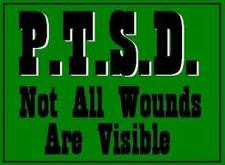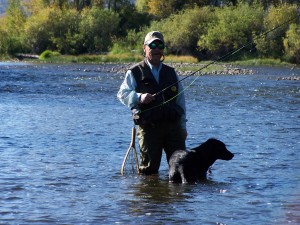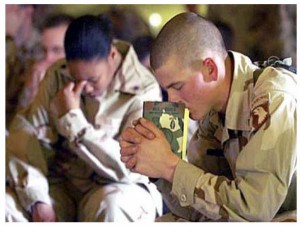Sep
28
SUICIDE: DID YOU KNOW?
Filed Under Combat PTSD, Life, PTSD treatment, Tears of a Warrior, Trauma, Treating PTSD, War | 1 Comment
by Janet J. Seahorn, Ph.D
Did you Know:
·
Suicide is one of the leading causes of death in America. Every year it takes more lives than auto accidents.
· Suicide impacts kids as young as five and as old as ninety-five.
· The rate of suicide in the armed forces continues to grow with each deployment.
· Current statistics show an active-duty suicide every 36 hours – 18 veterans a day dies by their own hand (Lily Casura, Napa Valley Register, 9/19/2010).
· Women vets are two – three times more likely to commit suicide than non-veteran women (American Psychiatric Association)
· Suicide is more than an emotional state; it is a physical condition as well.
· Depression is treatable… suicide is not —– the final step has already been taken.
Combat is an unhealthy enough challenge. Yet, when a veteran returns home, the struggle may be even worse. Worse because there are fewer people to talk to who understand what he/she has gone through. Worse because during combat one didn’t always have time to think about the horrors of war; now at home, there is often too much time to think. And worse, because depression of any kind is a hidden desperado that becomes a very real physical condition, few understand and address the issue.
In so many cultures, including American, we have been led to believe that depression is something that is strictly emotional. Something that we can easily get over if we just put our “minds” to it. It invades every cell of the body. It steals the good hormones such as serotonin, endorphins, dopamine… and replaces them with a whopping dose of cortisol – one of the stress hormones that cause fight, flight, or freeze. Unfortunately for many, the way one may must fight or fight depression is suicide.
One reason this issue is so important to me is it hits close to home. In the city of Fort Collins, Colorado, suicide has already been the cause of over 39 deaths this year – far more than those who die in traffic accidents. One of those statistics was a close friend of a student in my university class. Imagine sitting in class and getting a text message stating your close friend has taken her life. When I was teaching middle school many years ago, a wonderful young man decided to end his life before he ever had a chance to begin his life. His parents were certain their child’s death was an accident, even though evidence indicate the young man made three different attempts at ending his life before one finally worked.
It is important we all know more about this topic, Suicide. Like any enemy, the more we know about our opponent, the better we can fight the battle and win. So I’ll end with one of my favorite quotes by Emily Dickinson, “Not knowing when the dawn will come, I open every door.” Try to keep opening new doors; sunshine is waiting behind one of them. 
Sep
5
IF YOU’RE NOT OK, THEN WE’RE NOT OK
Filed Under Black Lions, Brain Injury, Combat PTSD, Family, Life, PTSD, PTSD treatment, Tears of a Warrior, Treating PTSD, War | Comments Off on IF YOU’RE NOT OK, THEN WE’RE NOT OK
by Janet J. Seahorn

Every day there are more and more wounded victims of war. These are the spouses, the children, the parents, the sisters and brothers of the veteran… and the list grows. It is one reason that we continually urge those impacted by serving in a war zone to get help as soon as possible if they begin to feel the “fall out” effects of combat.
There are centuries of evidence that prove this point. When a person returns from a traumatic experience and normal life is no longer normal, those around will become part of the trauma. It is an obvious statement, yet, there are too many veterans and families that refuse to acknowledge and deal with the situation.
It is like having an elephant in the room that no one wants to recognize or admit is there. The unrealistic thinking goes something like this… “If I just ignore the large problem, it will eventually go away”. The only problem with the problem is that it does not go away, in fact, it often grows bigger and bigger. And it begins to become more active. Imagine having a raging elephant in the room charging around with its large tusk and huge trunk. Wow, and I haven’t even mentioned all the crap it leaves lying around. It feeds on everything in sight, so eventually your house is a mess and you don’t have a safe place to hide from the growing beast.
Human nature seeks coherence and peace, even in the most chaotic of times. It is always looking for that which is safe and enjoyable. It craves stability and excitement, joy and delight. When these are absent for long periods of time, it is easy for depression and hopelessness to set in. You see, if someone you deeply care about is not OK, then it is quite challenging for you to be OK. And if both of us are not OK, then WE, as a couple, a family, a relationship, are not OK! Herein lies the hard choice — you can either accept the “crap” and continue on the path you may currently be on, or you can make another choice. A choice that can lead to healing. A choice that may allow the relationship to be more positive and loving. A choice that begins to do something about THAT elephant in the room.
Either way, we all choose which way we will continue our journey. Whatever choice we make will not be an easy path. However, one definitely has more constructive possibilities than the other. We persistently mention that if children are involved, than getting the elephant out of the room is crucial to their well-being and healthy development. As adults, we make our own choices, but children are subject to the outcomes of our choices. More than likely, they don’t get to have a voice; they are the helpless victims of our selection, good and bad. Therefore, think deeply about what you are and are not doing. Your children’s lives depend on which options you make.
For some of us, we didn’t have the information about PTSD, TBIs (Traumatic Brain Injuries), and other impacts of war. We did the best we could; at least, we want to hope we did. New military personnel have better information. They can and must make better choices, if not for themselves, for their children and the future of our next generation. Healthy life truly depends on this choice.
Aug
28
THINKING ABOUT WAR AND PEACE
Filed Under American Patriotism, Black Lions, Combat PTSD, Tears of a Warrior, Today's War, War, Wisdom | Comments Off on THINKING ABOUT WAR AND PEACE
by Janet J. Seahorn

For the last several weeks, my husband and I have been researching and preparing for a presentation we would be giving to the Nebraska Vietnam Veteran Reunion.
We were asked to talk about how we came to write our book, Tears of a Warrior: A Family’s Story of Combat and Living With PTSD. It was such an honor to be invited to be a part of this amazing event which has been going on for the last twenty five years. The night before we left, I read an article Tony had given me titled, “Our Helmets Duel No More”. It was written by retired Lt. General Hal G. Moore. Some of you may be familiar with General Moore as he wrote the books, We Were Soldiers Once… and Young (1992) and We Are Soldiers Still (2008).
Reading General Moore’s experiences regarding the Vietnam War, and later revisiting the country and meeting the Viet Cong General he fought against over forty years ago, made me wonder if such a reunion would ever be possible for those fighting in Iraq and Afghanistan? I questioned whether either side would be able to feel forgiveness. Whether the intense hatred some people in these countries feel for Americans, our way of life, our religions would lessen with time? Whether the many good deeds both our military and civilian organizations are doing building schools, hospitals, and other improvements will be remembered?
What I did not wonder about was the incredible amount of loss, pain, and sorrow war of any kind takes on a country, a community, and, most of all a family. General Moore began his story with these words, “When the blood of any war soaks your clothes and covers your hands, and soldiers die in your arms, every breath forevermore becomes an appeal for greater peace, unity and reconciliation between nations”. Wounds of the body and soul are branded deep into the heart. Those who fight for America pay a very high price for her freedom.
The article read like so many war stories. Trauma, victory, failure, sorrow, the ugliness of battle… and the list goes on. But the piece ended with some pretty profound advice:
When the heartbeat of one soldier stops forever, the heartbeat of our nation should accelerate, driving us to ensure that this life was not sacrificed in vain. It should rouse us to seek better ways to understand and deal with international differences. We owe our dead and their survivors no less. We owe our children, and our children’s children, much more”.
The leadership we loose with each life, the intellectual and emotional goodness broken by combat may only be repaired with each person’s prayer, and every country’s commitment to searching for more appropriate ways to solve our differences. But until or if this every happens, we need to make sure whoever we send to fight our wars, as a nation we must do everything humanly possible to mend, not only the warrior, but the family unit that was also part of the sacrifice.
God Bless America, and God Bless our Vets, Young and Old and their Families
Aug
25
SPOUSE NEEDS HELP
Filed Under Black Lions, Combat PTSD, PTSD, PTSD treatment, Tears of a Warrior, War | Comments Off on SPOUSE NEEDS HELP
by Janet J. Seahorn

There it is again – another message from a spouse needing help to cope with the conditions his/her companion faces after returning from combat.
Just reading their stories make me feel like weeping, screaming, and wondering… why our various government systems aren’t doing much in this area. To be sure, some Vet centers are implementing some innovative and helpful programs for spouses and families. Yet, far too many are going unnoticed and unheard. Some spouses don’t know where to go to access services; some simply can’t find anything near them that makes it feasible to get such services; and some want/need groups they can access through the internet. As one person explained… I am looking for a group that will tell me what they are going through and how they are handling it. I want some group I can talk to and be open and honest with that I can tell them the things that wives of PTSD vets are afraid to open up about…PLEASE HELP ME TO FIND THAT GROUP I KNOW SOME OF THE THINGS I HAVE GONE THROUGH I DON‘T WANT ANYONE TO KNOW ABOUT…
There is such pain just hanging out in our families and their personal relationships. Pain that few others see. Pain that the spouse and family don’t feel comfortable or safe sharing with anyone other than individuals who have been through similar experiences. Finding appropriate and effective programs need to be a high priority if our veterans and their marriages are to survive in a healthy and positive relationship.
After reading an e-mail from a wife of a Vietnam vet with PTSD who is also the mother of a son who just returned from combat with similar difficulties (double whammy), I responded with this note. I hope she won’t mind me sharing with our readers, since she is only one of hundreds who are worried, discouraged, and questioning what can be done to make things better. In almost every such message, the writer speculates if she has done something wrong or not done enough, whatever enough might be in these situations. Below is my response – I hope it helps.
Please know you have done nothing “wrong by your children”… war has done the damage. PTSD is similar to trying to swim upstream through raging rapids and water falls. It is a moment by moment and daily challenge, but there is hope. The key is to get as much information as possible, set and STICK to appropriate boundaries, and try as hard as you can not to make excuses for your husband’s or son’s behavior. I did this for a very long time and still, at times, fall into this hole. By making excuses for our loved ones, we do not hold them or ourselves accountable for the behavior. Just like any challenging illness or disability, the individual and family must work twice as hard as those not encumbered by the condition. What I was really saying when I made such excuses is that I didn’t believe that either I or my husband could do better or get better, and that simply was not true or accurate. We continue to heal, but we still have our bad days/times, which we know won’t totally disappear. The biggest hope is that we are better than we were before Tony got help with the VA center. By writing the book (Tears of a Warrior), I spent nine years researching the information and thinking about how it related to our situation. I kept saying to myself, “if only I/we had known this when… we could have done so much better or differently”.
It is important that both your husband and son seek help with your nearest VA center. If you aren’t happy with the service there, go somewhere else. We found we had to do that and finally found a wonderful VA center here in Ft. Collins and Cheyenne. ### was not so helpful.
As for your son, I understand how you must feel… both my sons are grown and on their own, but there are times I wish I could “kiss their boo boos, and make the hurt go away” like when they were little. A mother’s heart never is far from those of her children. Just the way it is. Now I tell my sons, “I can not solve their problems, because this is yours to do for yourselves. But I will always be there to listen, support, and love you.” I try to end by telling them this…”I know you are a wonderful, intelligent, and strong person. And I know you have the determination and courage to solve this situation. I know this with all my heart and I trust you. Keep trying. You can do it.”
The other point that I will end with is to ask yourself, “Do we have more good times than bad? Are we both trying and improving?” If the answer is YES, we keep going. If the answer was ever NO, things would be drastically different.
I hope this helps. Please know there is help out there. Check with your VA center to see if their are any support groups for spouses. For some these groups are a big help… I believe one has to be in the right group – not in a group where everyone just complains and leaves more depressed.
One last note: I was truly surprised when I did some recent internet searches on support for spouse to find there are few available. One I found is
http://www.giftfromwithin.org/html/groups.html.
If in all your searching nothing viable is available, think about starting a group. Almost every organization and many services began with one person taking action and building something useful for others who share a similar need.
Best of luck and blessing.
Aug
11
STAYING OUT OF THE SAD SACK
Filed Under Combat PTSD, Family, Healing Waters, Peace, Pets, PTSD treatment, Tears of a Warrior, War | Comments Off on STAYING OUT OF THE SAD SACK
by Janet J. Seahorn

A few weeks ago we had the rare opportunity for my family to get together and spend some quality time floating, fishing, and just chilling out in Wyoming.
During one of our chats, my brother, a Vietnam Navy vet, started talking about how hard it is to stay out of the “Sad Sack”, especially when his PTSD starts rearing it’s nasty head.
Although it is not realistic to expect that any of us can totally avoid jumping into this particular “sack”, it is wise to try and do something more inspiring than hanging out in the land of gloom.
Go for a walk, listen to music, write, or take up pottery or painting… or fishing. Anything that can help take your mind off of the misery.
One Vietnam vet I recently heard from talked about some of the projects he has done and continues to do for the children in Vietnam.
So far he has built one kindergarden in honor of his best friend who was killed in combat forty years ago. He has another one in process, and has helped do the fund raising and building of a library to honor another high school classmate killed during the same conflict. By giving something positive back to the world, he declares, allows him to keep his ghosts in line. Gosh, organizing, fund raising, and constructing these amazing projects is a pretty impressive way to stay out of the Sad Sack.
I must admit that some of our sibling conversations made me go into the “Jovial, Laughing Sack” which seemed to annoy the others in the car just a much as if I were in the Sad Sack.
Seems like when only one person in the group finds a subject humorous, others give you that disgusting look that says “stuff” the mirth. Dang, now I couldn’t open my Sad Sack and couldn’t stay in my Laughing Sack, which, by the way, made me burst into even more hilarity
At any rate, the whole point of this message is that we live in and wear many sacks throughout our days. Some we consciously choose, a few tackle us when we least expect them, throwing our emotions into chaos. The challenge is to get out of the bad stuff as quickly as possible.
The lesson is to trust our faith and strength, realizing that just as the crappy stuff sometimes engulfs us, the wonderful, comical, and joyful is waiting for us to return to the good stuff. In a recent blog, Ancient Wisdom, we wrote about being strong.
So here it is, being strong will not prevent you from somersaulting into the Sad Sack, however, being strong will be the only thing that will get you out into something better.
You have the power and strength to reduce the size of your sacks, whichever ones you choose. Good Luck.
Aug
2
SHELTER DOGS AND PTSD VETS
Filed Under Combat PTSD, Dogs, Life, Love, Pets, PTSD treatment, Service Dogs, Tears of a Warrior, War, Wisdom | Comments Off on SHELTER DOGS AND PTSD VETS
by Janet J. Seahorn

It is such a privilege to write our blogs and then hear back from some of our readers. The blog on “Tears of a Mother” brought many wonderful comments. One such reader sent this message which made me smile. He wrote:
A SHORT STORY. MY WIFE AND I HAVE BEEN MARRIED FOR 40 YEARS. WE ARE HIGH SCHOOL SWEETHEARTS AND WHEN I GOT HOME FROM MY LAST HOSP STAY FOR A PANIC ATTACK, I ASKED HER WHY SHE HAS STAYED WITH ME FOR SO LONG. HER EXACT WORDS WERE. “I KNEW YOU WERE A CHANGED PERSON WHEN YOU GOT HOME. HER FRIENDS AND FAMILY SAID I WAS DAMAGED. SHE TOLD THEM THAT THE MAN IS SCARED OF EVERYTHING AROUND HIM. AND THAT SHE LOVED ME”. I DO NOT TRAVEL TOO FAR WITHOUT MY WIFE. I CALL HER MY HANDLER.
Isn’t that just the sweetest compliment he gave his wife, “my handler”, which, as you can see, he stated with genuine love and gratitude. His message reminded me of a very endearing commercial for “shelter” dogs we have here in Colorado. It starts out, “Don’t pity a shelter dog — honor him. Shelter dogs aren’t broken, they’ve just experienced a little more of life. In many ancient times they would be considered wise. They are the ones with tales to tell and stories to write. They have faced life’s challenges with courage and pride, and survived with honor and dignity”.
Sounds like many of our amazing vets. Just like these shelter dogs who have experienced a bit more than their canine siblings, veterans aren’t broken, damaged, or to be pitied. Most have gathered a deeper wisdom regarding life. And, yes, they have tales to tell and stories to write. With courage and pride they continue to live every day of their lives with honor and dignity.
Shelter dogs and vets. Golly, what a wonderful way to view the challenges of life…and PTSD.
Jul
19
Ancient Wisdom
Filed Under American Patriotism, Black Lions, Combat PTSD, Healing Waters, Tears of a Warrior, Wisdom | Comments Off on Ancient Wisdom
by Tony Seahorn

Reading stories from people in ancient civilizations can provide wisdom and understanding. Native American cultures often offer insight into the struggles we face as well as how to move forward.
In the book Keep Going: The Art of Perseverance by Joseph Marshall III, he speaks of a young Lakota boy talking to his grandfather trying to seek answers to his many questions. On one occasion he asks his grandfather “why life had to be so difficult sometimes.” The old man gave this as a reply:
“Grandfather says this: “Life can give you strength. Strength can come from facing the storms of life, from knowing loss, feeling sadness and heartache, from falling into the depths of grief. You must stand up in the storm. You must face the wind and the cold and the darkness. When the storm blows hard you must stand firm, for it is not trying to knock you down, it is really trying to teach you to be strong.”
Facing up to and living with PTSD offers an abundance of opportunities to practice perseverance and growing STRENGTH. At times, it is easy to hope that you have grown enough, but we don’t always get to choose when enough is enough. Life makes some of those decisions for us. And then, Grandfather, in his words of wisdom, offers his grandson these next words:
“Being strong means taking one more step toward the top of the hill, no matter how weary you may be. It means letting the tears flow through the grief. It means to keep looking for the answer, though the darkness of despair is all around you. Being strong means to cling to hope for one more heartbeat, one more sunrise. Each step, no matter how difficult, is one more step closer to the top of the hill. To keep hope alive for one more heartbeat at a time leads to the light of the next sunrise, and the promise of a new day.”
For all of those who face the demons of PTSD, perhaps Grandfather’s words will support you on your long journey. Perhaps Grandfather’s words will give you the power to get through one more day no matter how difficult.
And perhaps Grandfather’s words will “keep hope alive” for a bit longer until you once again feel the warmth of sunshine on your face and begin to live that promise of a new day.
Jul
12
TEARS OF A MOTHER
Filed Under American Patriotism, Combat PTSD, Family, Tears of a Warrior | Comments Off on TEARS OF A MOTHER

by Janet J. Seahorn
It came in the mail, a letter from a mother of a young vet who has already served a year of duty in Afghanistan. Even though we receive numerous letters from mothers, wives, vets, and even their children, this one kept coming back to my mind. Her words echoed the immense sacrifice families contribute when their loved one(s) serve in the military.
Given the current state of the economy, many military personnel cannot find employment once they are out of the armed forces. Some are left with few viable options to support themselves and/or their families except to re-enlist. This is the situation her son finds himself in now. Having to think about him returning to Afghanistan where every day becomes a bit grimmer is an alarming prospect.
What made her letter resonate familiar memories in me was going back to a time when I, as a young girl, watched and listened to the emotional rollercoaster my Mom (and Dad) went through while my brother was in Vietnam. Some nights when Dad was working late and she thought I was already asleep, I could hear her muffled crying. I am sure she was sobbing into her pillow to reduce the noise of her tears. It broke my heart because I knew there was little I could do to comfort her worries.
Later, after my brother returned home carrying the burdens of war, my mother faced another challenge – how to soothe, support, and deal with a young man who was very different from the happy-go-lucky son she once knew.
The tears continued as did the worries, for she understood that this new battle waging inside of my brother was just as formidable as those he faced in combat. And she understood, once again, there was little she could do to alter my brother’s new journey. She could be present to offer love and the stability of home, but he must be the one to do the work of emotional healing.
Combat’s wounds continue to take an enormous toil on the entire family, not just the vet. Such grief still continues to be done in silence, for vets and their families have long intuitively understood that few people who have not been in their position have a clue about what is occurring, every part of every day. Even if someone was willing to listen, how could one put into words the many hidden demons that returned as part of the baggage of war?
So many tears, so many wounds, and so much healing work still to be done. As long as war is part of our world, there will always be the sacred “Tears of a Mother”.
We need to remember to keep these gentle souls in our own hearts and prayers, and, perhaps somewhere in the distant future, there will no longer be a need for tears to be shed because of war, greed, or some leaders’ insatiable need for power.
When and if such a state of affairs ever happens, tears might be replaced with joyfulness and peace. We can only hope.
Jun
30
PTSD Series Discussion #5
Filed Under Brain Injury, Combat PTSD, PTSD, PTSD treatment, TBI & PTSD, Tears of a Warrior, Treating PTSD, War | Comments Off on PTSD Series Discussion #5
By Janet J. Seahorn

When is it time to seek outside help?
This is pretty easy to answer: You will know if it is time to seek outside help when the behavior of the serviceperson becomes abnormally un-normal. When life becomes a teeter-totter of ups and downs that can’t seem to be controlled no matter how hard you try. When your surroundings and relationships seem unstable and unsafe and you aren’t sure why, get help.
When my husband began experiencing PTSD, neither one of us had a clue what was going on at the time. There was no such thing as Post-Traumatic Stress. War was something that a person went to, came home from and tried to move on. It wasn’t discussed. It wasn’t thought about (or so we once thought and wanted to believe).
No one considered how the events of combat could impact an individual for the rest of his life. If you came home somewhat physically whole, that was a gift. You healed physically, and you lived as if all the horror from battle never happened. The past was the past and it should not impact one’s future. What an absurd assumption.
Now we understand that nothing in our past is ever fully in the past. The good and the difficult follow us wherever we go. We are part of our experiences. With understanding, courage, and information we may gain strength and wisdom to move forward. Getting outside help can guide us in forming the wisdom and understanding needed for healing.
What are some good resources for help with PTSD or TBI?
There are many resources available to our military service men and women. Check with your local Veteran’s Administration Center if you suspect you need support. You may need to be referred to a Veteran Hospital for further testing and diagnosis, especially if you suspect a traumatic brain injury. Every state has several local centers that have been established to help veterans find the appropriate placement and support needed to get the services they may require. (VA Centers are listed in our book)
Don’t stop at NO if you are convinced you have something wrong that necessitates some form of treatment. Sometimes all you need is that one special person who can take your situation seriously enough to get help. Our family personally saw this happen with my brother. He was extremely wary of anyone associated with the government. As a Vietnam vet, his mistrust of a broken, ineffective system made him reluctant to seek help from a military or veteran organization of any kind. Once he decided to seek services he ran into several brick walls. Yet, he kept trying, until he finally found a former army sergeant who took his situation seriously and made things happen.
It only took one person to make a difference. Don’t’ give up or give in to frustration. Keep going. Help is available, but sometimes you may have to fight for it just like you did in battle. If you did it then, you can do it now.
In ending, we want to thank you and your loved ones for your service and sacrifice. You have made a difference that few will understand, or perhaps fully appreciate. Nevertheless, please recognize the depth of your courage, strength and warrior spirit. These are the attributes that sustained you through combat, and now they will do so again in moving you towards healing and a better life.
Jun
24
PTSD Series Discussion #4
Filed Under Combat PTSD, Events, Family, PTSD, Tears of a Warrior, War | Comments Off on PTSD Series Discussion #4
by Janet J. Seahorn

How can we talk about PTSD as a family?
Gosh, this is a tricky question with an even trickier answer. As we have discussed in most of the prior questions, the first step is to acknowledge that upon returning from combat things aren’t quite normal. Become informed about the signs and symptoms of PTSD. Be honest as much as you can about what each of you is feeling. As the service person, you don’t have to go into all of the horrible details of your experiences, but you do and will need to discuss the truth that your military life in a combat zone may have been pretty distressing; that what you saw and did was often unsettling.
As the significant other or spouse, your role initially is to just listen. Try not to ask too many questions. Sometimes it may seem you are prying. Try and wait a bit before going into the details. But it is crucial, as a family, to talk. Silence is simply not an option. It creates distance by making assumptions about behaviors that may not be accurate.
In our book, we describe an incident where a young man who had been in several roadside bombings returned home from Iraq. On a quiet Saturday afternoon, the family decided to take a trip out of town to a favorite shopping center. It was to be a fun outing of togetherness. Things were going well until the young family came to bridge where a man waving for help was standing by the roadside next to a car with a flat tire. The wife suggested they stop and help, however, the young serviceperson immediately turned his vehicle around in the middle of the road, angrily stomped on the gas and headed home. Not knowing what was happening, the wife assumed her husband was acting unreasonably. It was a silent ride back to town. The young vet never told his wife what was going on in his mind. Later, during his scheduled visit to his VA counselor he retold the story. He knew his wife and children were upset with him for ruining their fun afternoon. However, what he saw was not an ordinary man with a flat tire needing help. What his mind and body saw and felt was a possible setup for an IED (Improvised Explosive Device). He had seen this many times during his tour of duty in Iraq. He had two thoughts to keep his family out of harms way: 1) He could shoot the “terrorist” standing on the roadside, or 2) He could, without delay, get his family away from the danger zone. Understanding that shooting the “threat” was probably not the best decision, he chose option two. Makes perfect sense, but without talking he went home angry and upset. And his family had no clue as to what had just occurred.
In our book we advise “If you care, you share”. Sharing creates understanding. Understanding generates compassion. And compassion establishes hope and protects the relationship.
Another word of advice about discussing a concern: Never try and sit down to talk over an issue when one or both parties are in a full pitch of rage or anger. You can’t stop a charging bear… it is already on a mission to attack. You must wait until tempers are calmer and conditions settle down enough to have a reasonably calm and “adult” discussion. If a blaming game begins, stop immediately. Blaming never solves the problem; it only throws more fuel on a hot fire. Use “I” statements such as, “I start to feel afraid when I see you getting angry and I don’t understand why?” or “It is hard for me to go to family events without you. I miss doing things together and want to know what I can do to make it OK for you to attend some of our family get-togethers.”
Most of our family conversations, once we began to understand what we were facing, resulted in a compromise that everyone could agree would make the situation better for all involved. We now try not to live on assumptions by doing a reality check with the person. For family events, every person becomes responsible for him or herself. Sometimes my husband chooses downtime away from a houseful of noisy people. He goes to a quiet room to watch TV or read a book while the rest of us play a rowdy game of Pictionary or Shout It Out. This is a Win/Win for everyone and is absolutely acceptable behavior.

